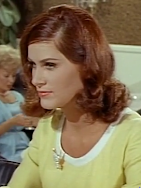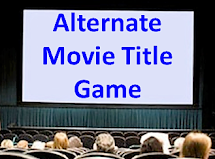 |
| Wagner as Mike Banning. |
Banning (1967) often gets categorized as a golf movie--heck, it was even shown on the Golf Channel at one time. It does involve golfing, particularly during the climax, but the reality is that
Banning is the equivalent of a big screen soap opera--and I mean that as a compliment. It's set at a posh Arizona country club whose members include a wily old millionaire, his lonely daughter and conniving son-in-law, a washed-up golf pro, a sultry hussy, and an attractive secretary. These people have settled into their roles at El Presidente until their lives are disrupted by the arrival of Mike Banning (Robert Wagner).
A former professional golfer with a shady past, Banning blackmails club member Jonathan Linus (Guy Stockwell) into hiring him as an assistant golf pro. The good-looking Banning attracts the attentions of Jonathan's ignored wife (Susan Clark) and a wealthy socialite (Jill St. John). However, he has set his sights on Carol Lindquist (Anjanette Comer), the club's secretary who harbors a few secrets of her own. His romantic pursuit of Carol is stifled by the arrival of a mob debt collector. It turns out that Banning owes $20,000 to an old pal whose gambling losses need to paid up or else!
 |
| Jill St. John. |
If you temper your expectations,
Banning is an entertaining lightweight drama that relies heavily on its cast. It's not that it's a particularly well-acted film, but rather its makers chose the right actors for each role. Robert Wagner made a career out of playing the handsome, likable guy with a bit of an edge. Jill St. John always fared best when playing exaggerated characters like Tiffany Case in
Diamonds Are Forever. And Susan Clark seemed to specialize in playing strong, intelligent women who were not to be underestimated. Add in a mix of seasoned pros (e.g., Gene Hackman, Howard St. John) and promising young actors (James Farentino) and you've got 102 minutes of fun.
 |
| Susan Clark. |
Banning was made in the late 1960s when Universal Studios was producing modestly-budgeted films with an eye toward television profits. Many of these pictures were headlined by TV veterans, such as Jack Lord (
The Ride to Hangman's Tree), Don Knotts
(The Reluctant Astronaut), and Doug McClure (
The King's Pirate, a remake of
Against All Flags). The studio even made a theatrical film based on its TV sitcom
The Munsters (1966's
Munster, Go Home!). Thus, it's not surprising that
Banning is sometimes misidentified as a made-for-TV movie. (Hey, future spouses Robert Wagner and Jill St. John
did star together in a made-for-TV movie that same year: the quirky
How I Spent My Summer Vacation).
Make no mistake, though, that Banning was released to theaters--and it's got an Oscar nomination to show for it! Yes, the lovely Quincy Jones-Bob Russell composition "The Eyes of Love" was nominated for Best Original Song (losing to the inferior "Talk to the Animals" from Doctor Doolittle). It's apparent that Banning director Ron Winston knew he had a good song because "The Eyes of Love" is played throughout the movie. Jack Jones and Trini Lopez recorded cover versions of it and Quincy included it on his album You've Got It Bad Girl. However, here's the original version sung by Gil Bernard.
Of course, you could just watch Banning. It was a hard-to-see movie for many years, but fortunately my Twitter pal @CED_LD_Guy has uploaded Banning to his "Your Favorite Movies By Request" Rumble Channel. Rumble is similar to YouTube. To watch the movie, just sign up for a free account, log in, and click on this link.

















